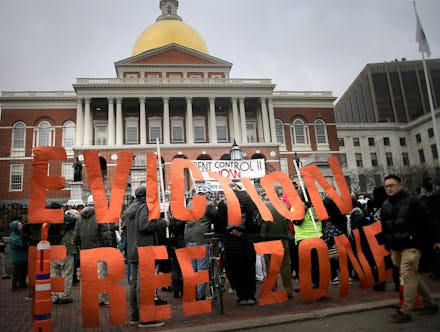Cities are pausing eviction notices to help with social distancing

You hear “stay indoors” and “work from home” as methods for containing the spread of coronavirus. But how do you stay at home if you’re being evicted? This week, mayors in cities across the U.S. moved to halt eviction activities so as to contain the spread of coronavirus and ensure that residents had a safe place to live while the outbreak persists.
On Thursday morning, Miami-Dade County Mayor Carlos A. Giménez (R) declared that the city’s police department would halt eviction activities for the duration of the coronavirus outbreak, in a move to protect the community from the spread of coronavirus. Florida has reported 17 cases of coronavirus.
Alvaro Zabaleta, a public information officer for the Miami-Dade County Police Department, tells Mic that “due to the current conditions we want people to be safe. The best place to be safe is indoors.” He however wasn’t able to indicate how long the practice would hold, just that “it's all depending on the current conditions.”
“This is a thoughtful measure to make sure folks are not adversely affected during this outbreak. The people of Miami should be able to focus on keeping their families safe and healthy, instead of worrying about making ends meet,” Micah Kubic, the executive director of the Florida arm of the American Civil Liberties Union, said in an email to Mic. Francis Suarez, the mayor of the city of Miami, announced Friday that he'd tested positive for coronavirus.
In the course of a week, the U.S. has taken extensive efforts to increase social distancing measures, all of which require some form of isolation. Governors in Washington, Michigan, Ohio, and other states have closed down schools for weeks at a time, sending children home. Employers are encouraging employees to work from home if they can, and some municipalities have outlawed gathering in groups of more than 250 people.
President Trump declared a national emergency Friday over the coronavirus pandemic, though his announcement was light on specifics about how the government plans to address the colossal shortage of available tests. In the meantime, the short-term solution to mitigating the virus's spread involves Americans staying home.
Early Friday morning, Massachusetts Sen. Ed Markey (D) called to suspend mortgage payments and evictions throughout the country, mirroring Italy’s action to halt debt repayments, including mortgages, while the country is effectively shut down as part of their response to the spread of coronavirus. Millions are locked down in Italy, where over 1,000 people have died from the illness.
In Oakland, California, city council member Nikki Fortunato Bas called for a moratorium on evictions, following the lead of neighboring cities of San Francisco and San Jose. "We're sort of seeing this idea of housing as a human right play out," Bas tells Mic. "There are recommendations and guidelines about social distancing, self-quarantining, working from home — all of those things point to the ability to have housing stability."
The California Bay Area is one of the most expensive places to live in the country, with monthly rents averaging $2000 to $3000, a 70% increase from 2010. Oakland is the site of the grassroots movement Moms 4 Housing, which has drawn national attention for pushing back against the affordability crisis and the criminalization of poverty.
Many say that the housing crisis in the United States is a symptom of larger structural issues of wealth distribution, racism, and inequality. In 2016, approximately 2.3 million Americans were evicted from their homes, with about 1 in 40 renter households evicted between 2000 and 2016. In neighborhoods in the city of Atlanta, for example, the eviction notice rate can top 50%. Oftentimes, tenants won’t be made aware of additional housing costs or taxes until it’s too late, or may be forced to choose between making payments on the car they need to get to work, buying groceries, and paying rent.
Advocates say that efforts by cities to manage the spread of coronavirus, including halting evictions and continuing water service for poor residents, shines a light on the multiple and compounding public health crises — not just of disease outbreak, but also of housing and water insecurity created by economic inequality.
"The virus doesn't discriminate based on race or ethnicity, but there are structural problems that underly our ability to provide housing for everyone in our community," Bas says. "I think with this health crisis we're seeing those problems manifest in terms of how [some] will have more access to health and safety during this health crisis, and those people who are unsheltered or who are living paycheck-to-paycheck and could potentially lose their homes are the most vulnerable."